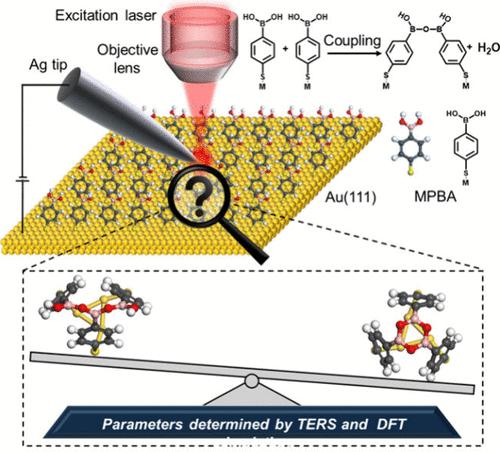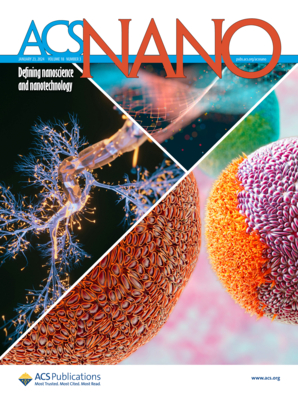Monitoring the On-Surface Boronic Acid Condensation Process at the Nanoscale Using Tip-Enhanced Raman Spectroscopy
IF 16
1区 材料科学
Q1 CHEMISTRY, MULTIDISCIPLINARY
引用次数: 0
Abstract
The on-surface condensation of boronic acids is a key step in fabricating functional interfaces with tailored properties; yet, a clear understanding of the molecular structural transformations involved remains a significant challenge. Here, we directly monitor the condensation reaction in a self-assembled monolayer of 4-mercaptophenylboronic acid (MPBA) on Au(111) using tip-enhanced Raman spectroscopy (TERS). The structural evolution in the MPBA adlayer is tracked via the emergence of new peaks, blue shifts, and intensity changes in characteristic Raman bands. Hyperspectral TERS imaging provides comprehensive insight into molecular transformations, including B–O–B bond formation, increased molecular constraints, and an evolution in molecular orientation. Furthermore, density functional theory simulations confirm that the boroxine trimer is the primary product of the on-surface condensation reaction. This study provides significant insights into on-surface boronic acid condensation chemistry for the rational design of functionalized surfaces with targeted chemical properties.

利用尖端增强拉曼光谱监测纳米尺度表面硼酸缩合过程
硼酸的表面缩合是制造具有定制特性的功能界面的关键步骤;然而,清楚地了解其中涉及的分子结构转变仍然是一项重大挑战。在这里,我们利用尖端增强拉曼光谱(TERS)直接监测了金(111)上 4-巯基苯硼酸(MPBA)自组装单层的缩合反应。通过特征拉曼光谱带中出现的新峰、蓝移和强度变化,跟踪 MPBA 吸附层的结构演变。高光谱 TERS 成像提供了对分子转化的全面了解,包括 B-O-B 键的形成、分子约束的增加以及分子取向的演变。此外,密度泛函理论模拟证实硼氧三聚体是表面缩合反应的主要产物。这项研究为合理设计具有目标化学特性的功能化表面提供了表面硼酸缩合化学的重要见解。
本文章由计算机程序翻译,如有差异,请以英文原文为准。
求助全文
约1分钟内获得全文
求助全文
来源期刊

ACS Nano
工程技术-材料科学:综合
CiteScore
26.00
自引率
4.10%
发文量
1627
审稿时长
1.7 months
期刊介绍:
ACS Nano, published monthly, serves as an international forum for comprehensive articles on nanoscience and nanotechnology research at the intersections of chemistry, biology, materials science, physics, and engineering. The journal fosters communication among scientists in these communities, facilitating collaboration, new research opportunities, and advancements through discoveries. ACS Nano covers synthesis, assembly, characterization, theory, and simulation of nanostructures, nanobiotechnology, nanofabrication, methods and tools for nanoscience and nanotechnology, and self- and directed-assembly. Alongside original research articles, it offers thorough reviews, perspectives on cutting-edge research, and discussions envisioning the future of nanoscience and nanotechnology.
 求助内容:
求助内容: 应助结果提醒方式:
应助结果提醒方式:


